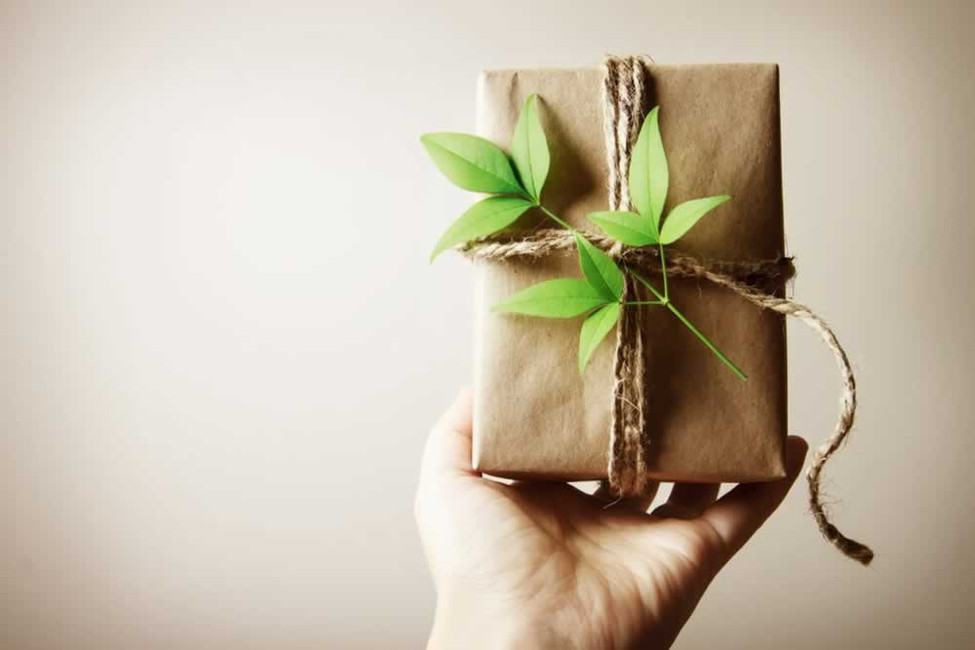
10 ways to have a more ethical & sustainable Christmas
Christmas is a time for celebration, time spent with friends and family, giving, and reflecting on the year that’s past. It can also be known for over-indulgence, over-consumption, and waste. Research from the Commonwealth Bank claims Australians spend over $16.2 billion at Christmas – that’s $993 for each adult. Gifts are the biggest expense, with each adult spending an average $475 on presents and a combined $554 million on extra food and drink. However, just half of these gifts will be wanted, and a third of all that extra food is wasted.
So, we thought we would put together some handy hints to keep in mind this festive season. Here are 10 ways to have an ethical and sustainable Christmas!
1. Wrap mindfully
There should be no shame in reusing wrapping paper and gift bags! We think it’s the best idea. When you’re deciding how to wrap your gift, go for something that the receiver can keep and use again, and that can be recycled. We are big fans of using old newspapers for wrapping or brown craft paper. It’s best to avoid anything that is lined with foil or has glitter on it, as these can’t be recycled.
2. Buy a real tree
There are so many reasons why you should ditch the plastic trees and buy a real one! First and foremost, they smell amazing. How lovely it would be to be welcomed into your home with the scent of fresh--natural pine. Even better, you can mulch or compost them at the end – which makes them carbon neutral. If you don’t have the garden for this, almost every council in Australia will collect Christmas trees for free and mulch or compost them! You just can’t lose here.
3. Don’t waste food
Make a list and check it twice! Have a think about how many people you will be catering for, then figure out how much food you will really need. It’s also important to make sure you store your leftovers correctly to prolong their shelf life, and to figure out ways you could reuse them. A great idea for leftover ham is making a split pea and Christmas ham soup! Otherwise, the trusty old freezer is your back-up.
4. Recycle and compost
Don’t forget to throw out packaging, wrapping paper, and food scraps carefully. Try to buy produce from your local farmer’s market, and pantry staples from your bulk food store, to minimise wasted plastic packaging. As you cook, have a handy container at the ready for your produce scraps to be used for compost.
5. Keep jars and containers
There are so many uses for jars and containers. Instead of disposing of them when they are empty, consider washing and keeping them. Jars make wonderful storage for pantry staples and are great for DIY craft projects (Just search on Pinterest!). As for containers, they make the perfect countertop compost bin for food scraps, and for general bits and bobs!
6. Buy Fairtrade and local
Instead of online shopping or buying from mega chain stores, think about buying local from your farmers’ markets, arts and crafts markets, small businesses, or ethical Fairtrade stores like Oxfam. By buying local, you are supporting your local economy as well as reducing emissions as a result of decreased road and air freight.
7. Keep your reusable bags handy
Don’t get caught out. Get smart with your reusable bags and keep them in handy places. Keep some in your car, handbag, and work desk to avoid needing to buy plastic bags when you reach the checkout. If you do find yourself with no other option, ask if there are any spare cardboard boxes you can use!
8. Make your gifts
What better way to show someone how special they are to you than by making them a handmade gift. Our favourites are baking some delicious treats, potting a plant, making some origami, or giving a voucher to take them for a picnic!
9. Regift or Op Shop
If you don’t want to go down the handmade gift path, have a look around your house for things you no longer want or need. This may take the form of unwanted gifts or that item you bought yourself but never took out of the box. We all have something! Or go to your local Op Shop and nab yourself a special and a find which you can be sure no one else will have. This reduces so much clutter, waste and over-consumption!
10. Donate
This Christmas, it’s important to remember that there are so many people in the world who have very little, or nothing at all. As an alternative gift, consider donating on someone’s behalf to a cause they resonate with. An Essential Poll commissioned by ChildFund found half of those surveyed would be “pleased” or “very pleased” for a donation to be made on their behalf. Only 9 per cent said they would be “displeased”. If you’re not sure your loved one would like this as a gift, a safer tactic might be for you to ask others to make a donation on your behalf.



Be a part of their story
#ihaveanewlife #realvillagepeople